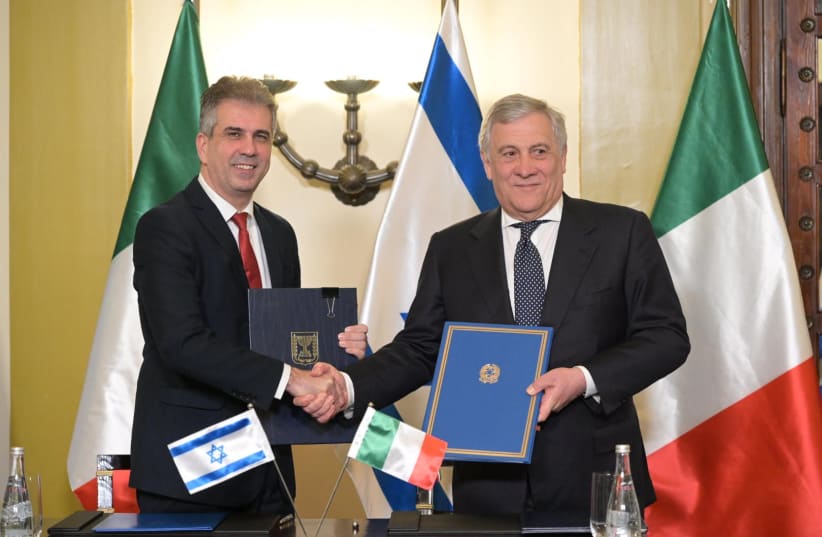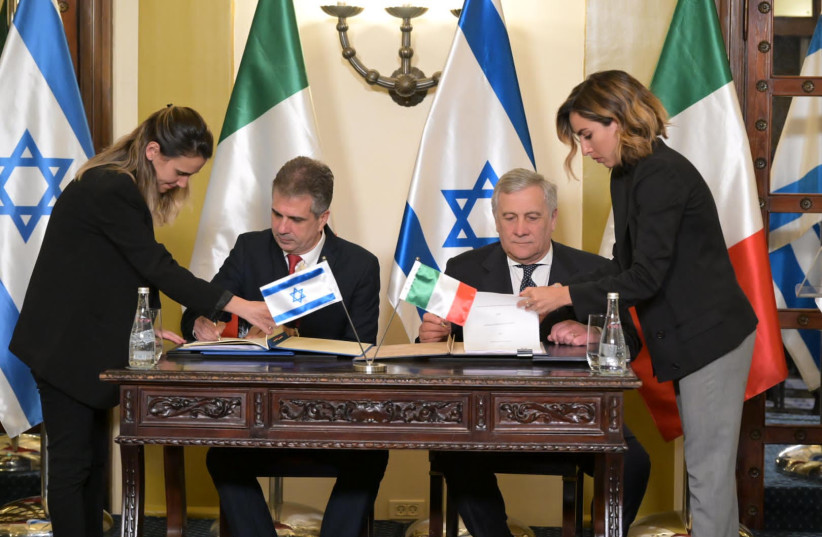Italy must help sway the European Union to stop activities related to the Israeli-Palestinian conflict that encourage violence, Israeli Foreign Minister Eli Cohen told his Italian counterpart Antonio Tajani when they met in Jerusalem on Monday night.
“I asked my friend .. Tajani to act to prevent European intervention in the Israeli-Palestinian conflict, as such activity often encourages incitement and terrorism.”
Foreign Minister Eli Cohen
“I asked my friend .. Tajani to act to prevent European intervention in the Israeli-Palestinian conflict, as such activity often encourages incitement and terrorism,” Cohen said.
It was a reference to the EU support, including by Italy, of Palestinian development in Area C, a section of the West Bank that the EU believes will be part of the boundaries of a future Palestinian state. Most politicians in Prime Minister Benjamin Netanyahu’s government hold that it should be part of Israel’s final borders.
EU activity in Area C has sparked tension between the European bloc and Israel.
Neither politician mentioned a push by Prime Minister Benjamin Netanyahu when he was in Italy last week to sway Rome to recognize Jerusalem as its capital.
Cohen also asked Tajani to help sway the EU to avoid attempts to influence internal Israeli politics.
It was a veiled reference to the turmoil surrounding the government's push for judicial reform. The EU is concerned that the overhaul plan could weaken Israeli democracy.
Italian FM shares concerns regarding escalating tensions
Tajani said he was worried by the escalating Israeli-Palestinian violence. He condemned any terror attack, such as those in which Israelis were killed.
Italy, he said, is ready to advance any initiative that would bring Israeli and Palestinians back to the negotiating table to make peace.
The Italian minister later met in Ramallah with Palestinian Authority President Mahmoud Abbas, who stressed the importance of halting "unilateral actions and adherence to signed agreements [with Israel]."
He also met with PA Prime Minister Mohammad Shtayyeh, who called on Italy to recognize the Palestinian state and pressure Israel to abide by the signed agreements with the Palestinians.
Tajani spoke with Cohen, just after a trip to Ramallah where he met with Palestinian Authority Foreign Minister Riyad al-Malki.
During the meeting, Malki “stressed the need to unite international efforts to confront Israeli colonialism,” the PA Foreign Ministry said in a statement.
It quoted Malki as saying that the Palestinians have “a strong and solid friendship with Italy, which we are working to strengthen and develop.”
Malki briefed the Italian minister on the latest developments and challenges facing the Palestinian issue and the region “in light of an Israeli fascist government fueled by bloody incitement rhetoric,” the ministry said.
Malki told the Italian guest that the Israeli government’s program “is based on committing crimes against the Palestinian people and their leadership, including killings, field executions, settlement expansion, and attempts to change the legal and historical status quo in Jerusalem, in addition to arbitrary arrests, discriminatory policies and practices, including against our brave prisoners, as well as crimes committed against our people.”
Malki also accused the Israeli government of “incitement” and warned that its policies will lead to a “real deterioration.”
He also thanked Italy for its stance supporting the two-state solution and for “rejecting the violations of the occupation and the settlers.”
The Italian minister, for his part, affirmed his country's support of the two-state solution and opposition to settlements. He also stressed his country’s commitment to supporting Palestinian institutions, especially supporting capacity building for the Palestinian police and training Palestinian diplomats.

